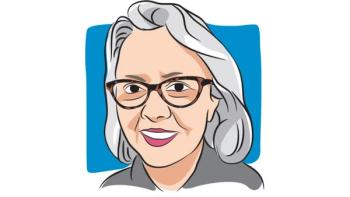
First-Line Treatment Options for laBCC
Anna C. Pavlick, DO, provides an overview of hedgehog inhibitors, a first-line treatment option for patients diagnosed with locally advanced basal cell carcinoma (laBCC).
Anna C. Pavlick, D.O.: Over time, we’ve been able to fill up our treatment option box with 2 tools to treat these patients. The first tool that was FDA approved 8 to 10 years ago was a class of medicines called hedgehog inhibitors. Hedgehog inhibitors are oral pills. They’re tiny pills that patients take daily that essentially block the pathway that 99% of all basal cell cancers use to grow. What do I mean by that? There are what we call metabolic pathways, or roads that the cancer cells or the basal cells use. As they go down those roads, they receive signals from the cells that say, “Keep growing. Keep spreading.” That’s a key target for us to stop the growth, because if we know what stimulus that’s telling the cell to grow—if we block that stimulus, if we block the signal—we can stop the cancer from growing. That’s how hedgehog inhibitors evolved. Hedgehog inhibitors block that signal, causing the basal cell carcinomas to not grow, to regress, to get smaller and to potentially either go away or become small enough where it becomes easier for our dermatologists or our surgeons to surgically remove them.
Hedgehog inhibitor medicine is considered the first line of therapy for patients who have unresectable or locally advanced or metastatic basal cell carcinoma. A lot of people will say, “It’s a pill, so it must be easy to take.” A pill is always easy for most patients to take, but hedgehog inhibitors do come with several side effects that may be difficult for our older patients to deal with because you must keep in mind that many of our patients are older, between 70 and 95 years old. Remember, as you get older, there’s an accumulation of DNA damage to your skin that can predispose this patient group to skin cancers.
When we see our patients who have these large locally advanced or metastatic basal cell cancers, we can offer them hedgehog inhibitors, but we have to be very careful because some of the side effects of hedgehog inhibitors include taste changes, loss of appetite, muscle cramps, and hair thinning. Most of our older patients already are dealing with some leg cramps from circulation issues, so they’re not unfamiliar with leg cramps. But if you have an older, very frail patient who’s already very thin and older, sometimes if you impact their taste buds and take away their desire to eat, you really make a huge impact on their quality of life. Taking away their ability to eat takes away a sense of satisfaction. It takes away a means of socializing with other people, so now you have an older person who gets no joy out of their meals, who just doesn’t have a desire to eat. If they do want to eat, it all tastes like—
essentially, patients tell me it tastes like metal.
They can lose weight. They can become more debilitated, and we can negatively impact their quality of life at the same time we’re fixing their cancer, making the patient worse. It can be a very delicate balance as to how long we can treat these patients and if we should treat these patients with these medicines. The answer is that it’s an individual decision. Sometimes we do have to do that. Sometimes it works out fine when patients say, “I have no side effects, and look how good my tumor looks.” Then there are some patients who, after a short period of time, do complain to us. They say, “I’ve stopped eating,” and that can be probably very problematic for patients.
Transcript edited for clarity.





